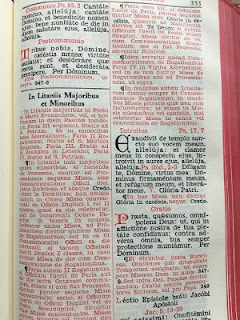In the former calendar, tomorrow, Tuesday, and Wednesday would have been Rogation Days - the three consecutive weekdays before the Ascension, when a quasi-penitential procession was traditionally held while the Litany of the Saints was sung. Although I am old enough to remember remember Rogation Days appearing on our home wall calendar and in my Missal, I never actually experienced their celebration. They just weren't part of typical, mid-20th-century, American, urban, liturgically minimalistic parish life. One hopes that they were still observed in more rural areas; but, if that was so anywhere in the U.S., I really don't know.
Like the similarly abandoned seasonal Ember Days, which involved fasting and actually were still observed in my time, the Rogation Days demonstrated how the post-classical and early medieval transition from paganism to Christianity did not destroy pre-modern people's consciousness of their dependence on nature or their need for a successful harvest or the value of ritualizing those needs in traditional ways on traditional days. In light of our own modern alienation from the natural world and the environmental catastrophe that has caused, we would have done better – instead of rationalistically abolishing such traditional observances in the 1960s - to have reaffirmed and reappropriated such ancient rituals of neediness and dependence that remain at the heart of our human experience, in a world which is in its own way just as threatening and challenging as was that of our ancestors.
(It is, of course, the 1960s which must be blamed for this liturgical misfortune, for the pre-conciliar commission which prepared and anticipated many of the later liturgical changes was only moderately hostile to the Rogation Days. In 1952, the rationalistic fixation on the unity of a desired 50-day Easter season led to the conclusion that the three pre-Ascension Rogation Days were not "in harmony with the spirit of Easter" and so "should be eliminated," but that a place should be found for a rogation procession and litany elsewhere during the year, probably on one of the Ember Days. The 1960 calendar compromised, keeping the Rogation Days but allowing Local Ordinaries to transfer them to other more suitable times of the year. Since they were already essentially a dead letter in the U.S., I rather doubt that too many did so.)
The old, pre-Ascension Rogation Days were Gallican in origin, supposedly introduced by Mamertus of Vienne at a particularly catastrophic time around A.D. 450. Thus, along with the seasonal aspect, these ancient observances highlighted the sense of struggle against dangers of all sorts (which even in more peaceful periods persist as an inevitable dimension of Christian life).
The centerpiece of the old Rogation Days was the procession during which the Litany of the Saints was sung. Speaking personally, I love litanies, because they are such a great vehicle for large congregations to participate actively and fully in communal prayer without needing either advance preparation or individual texts (since only the leader needs the text.) I especially like the Litany of Saints because of its antiquity and complexity, its multiple invocations that highlight our dependency and neediness, and its dramatic role in some of our more spectacular religious ceremonies such as ordinations and dedications of churches. Nowadays, ordinations are no longer associated with Ember Days and have largely lost any vestige of their traditionally quasi-penitential character. Thus, the litany may be the last link with that ancient tradition and ancient sensibility.
It would be pointlessly nostalgic liturgical romanticism to recommend reviving Rogation Days in our urban, post-industrial, commercialized world, but there is nothing nostalgic or romantic about the neediness and dependence that originally motivated them and that are reflected and expressed in the petitions of the litany - and that are still very real aspects of our life on this planet, however much we have tried to pretend otherwise.


No comments:
Post a Comment